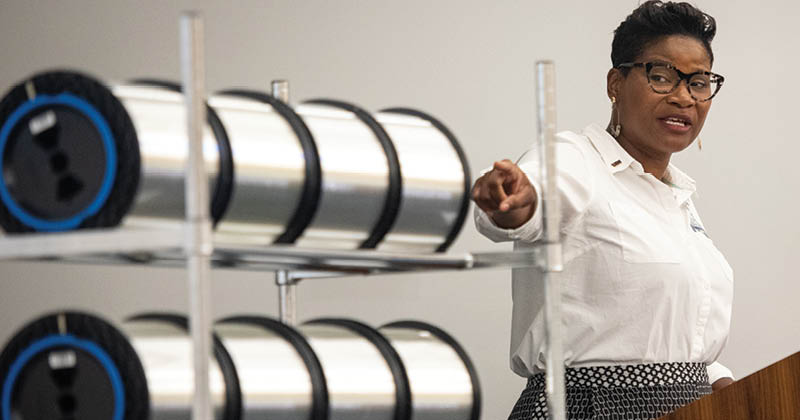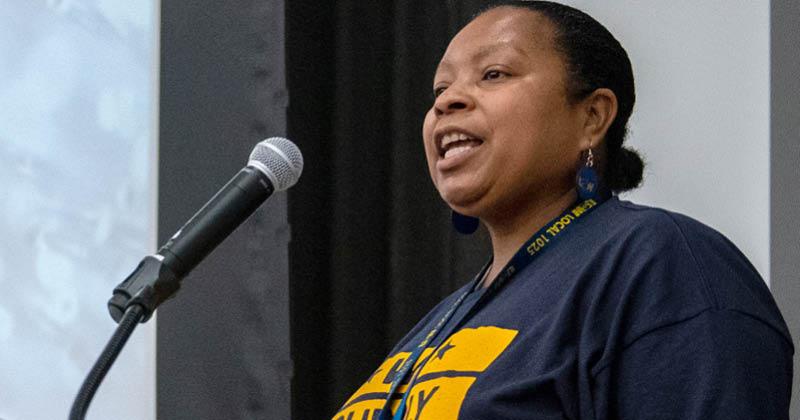USW Aims for Growth at Corning: Union Seeks to Follow Company Expansion in Fiber Optic, Solar Markets

The following article was originally published in the Spring 2024 issue of USW@Work.
—
Before Courtney Melvin was a member of Local 1025 in 2016, she worked in sales at a Best Buy store. The low pay and scant benefits at the non-union job made it difficult for the single mother to provide a good life for herself and her family.
“It took three years just to obtain benefits,” said Melvin, who now works at the Corning optical fiber plant in Wilmington, N.C.
“At Corning,” she said, “I got benefits on day one.”
Those benefits improved the well-being of her family, while her USW contract delivered strong wages, health and safety protections, and other life-changing improvements that union membership provides.
“In other industries, those were things that were non-negotiable,” said Melvin, who is part of the ongoing effort to encourage more workers to become USW members. “I definitely wanted to be a part of it so we could keep it going.”
Cutting-Edge Future
As Corning seeks to grow its business in the fiber optic and solar energy markets, the union hopes to follow suit, working to organize new members at those facilities, particularly in the notoriously non-union southern United States.
In Corning’s most recent annual report, CEO Wendell Weeks detailed recent declines in traditional sectors such as automobiles, televisions, smart phones and computers, while celebrating growth in the optical fiber and solar markets.
It’s that shift that drove the USW effort to organize at non-union Corning facilities focused on cutting-edge technology.
“If we want to have success as a union now and into the future, we have to go where workers are and build power with them, from the ground up,” said International Secretary-Treasurer John Shinn, who oversees bargaining for the USW’s Corning locals, including three in New York state, one in Virginia, one in North Carolina, one in Kentucky, and one in New Jersey.
Founded 173 years ago as a glass and ceramics company, Corning has consistently focused on research and development in an effort to diversify its product lines and grow its business. Over the years, the company spun off many consumer product lines into separate companies and, beginning in the 1970s, began focusing on specialty glass and materials used in industrial and scientific applications.
In 2007, for example, Corning developed and began manufacturing Gorilla Glass, an ultra-strong, ultra-thin glass used on iPhones, iPads and other touch-screen devices.
More recently, as smartphone and tablet sales declined and automotive production remained constrained, Corning shifted focus to the solar energy and fiber optic markets, particularly at non-union plants.
Meanwhile, the Biden Administration’s 2021 Infrastructure Investment and Jobs Act included $65 billion to deliver high-speed internet to the 24 million U.S. households that lack it, a major boost for exactly the kind of fiber optic cable Corning makes in Wilmington and elsewhere.
In addition, industry statistics show that solar energy accounted for nearly half of all new electricity-generating capacity in the United States in the first three quarters of 2023. And U.S. solar capacity is expected to more than double over the next four years.
“These transitions provide us with an opportunity to grow our union, to ensure that the jobs that are created in these emerging industries are good, community-sustaining jobs that provide a long-term future for working families,” Shinn said.

Corning’s Shift
Still, as its business continues to grow, Corning has in recent years begun a noticeable shift. Despite a long and productive relationship with the USW at locations across the eastern United States, the company has begun to move production of some of its most in-demand products to non-union shops, while stepping up its anti-union rhetoric.
Corning has seven locations in North Carolina, with only one of those – Wilmington – represented by the USW. Local 1025 President Donneta Williams is approaching 30 years at the facility and knows first-hand what the USW could do for workers at Corning’s non-union sites.
“I knew it made a difference,” Williams said. “When I came in, my income tripled.”
Besides the obvious financial benefits, she said, the USW shines a spotlight on health and safety issues, one that does not exist at non-union facilities.
“You have to hold the company accountable, and you have to hold your facility accountable to keep workers safe,” Williams said. “It’s very important to be at the table, to have a voice, and to make a change.”
Organizing Drive
It’s that desire to have a voice that is leading other Corning workers, in North Carolina and elsewhere, to challenge the status quo and push to join the USW.
Union drives are under way at Corning facilities in Concord and Hickory which also produce optical fiber, as well as a site in Durham that opened in 2018, where workers manufacture glass for pharmaceutical packaging, as well as other locations.
In addition to her role as local president, Williams serves as a vice president with the state AFL-CIO, and has seen an uptick in interest in unions from workers across the economy.
“We are wide open with activity,” Williams said of organizing activity in her state.
While North Carolina and most other southern U.S. states have so-called “right to work” laws designed to cripple unions, Williams, who comes from a family where both parents were union members, said the key to winning in an anti-union environment is educating workers.
“In the South, a lot of people have a negative view of unions,” she said. “They don’t understand that it’s a privilege to have a union to guide you, to stand with you, to fight for you. We try to convey that to new people.”

Organizing the South
Williams credited her predecessor at Wilmington’s Local 1025, Wilhelmenia Hardy, with prioritizing the education of new members and inspiring her to take on a leadership role.
After more than 20 years at Corning, Hardy took her leadership experience there and used it to launch a second career as a USW organizer. Now she helps workers throughout the South to understand the power of a union and to advocate for themselves through collective action.
Among the campaigns Hardy helped to lead was the successful effort last spring by 1,500 workers at Blue Bird Bus Co. in Georgia to join the USW. The victory gained national attention for its overwhelming success in the anti-union South.
The vote at Blue Bird was the largest union organizing win at a manufacturing plant in the region in 15 years, and provided inspiration for other workers throughout the South who are hungry for the benefits of union membership.
Still, Hardy said, organizing in the South, or anywhere, can be a difficult task when companies and anti-union political leaders gang up to intimidate workers.
“They have to want it. You can’t force it on any worker. They have to want change,” Hardy said. “So many workers are afraid, afraid they might lose their jobs if they even speak the word ‘union.’”
As Williams and Hardy agreed, getting workers past that fear means making sure they know what their employers are allowed – or not allowed – to do.
“Educating workers on their legal rights is a must,” Hardy said.
Eyes on the Future
As Corning moves more production work to non-union sites, the urgency of organizing those facilities grows. In addition, Williams said, members must continue to organize internally to ensure that workers in Wilmington and elsewhere buy into the importance of their membership in the USW.
“It’s challenging, but it’s important,” Williams said. “We can do more together.”
Melvin spearheads her local’s internal organizing work with entry-level employees. To help members learn about their rights and benefits, she created a Google Classroom page where members can read their contract and other documents and answer questions about what they learned.
“There is power in numbers. In order to ensure that we keep what we have now, we want to make sure that our numbers remain high,” Melvin said.
While working hard at the local level to build solidarity, Williams also collaborates with Shinn and leaders at other Corning facilities with USW contracts. Though there is not a master agreement for all Corning locations, council members coordinate bargaining and mobilization as much as they can, and members have volunteered in union organizing efforts.
“The solidarity is there,” Williams said. “We are there for our brothers and sisters.”
Building strength and unity among existing members, and recruiting those rank-and-file workers to organize others, will help potential members see the benefits of the union and inspire them to join the movement, Hardy said.
“If we have all the facilities in North Carolina, and if we all came together, it would be a win-win for everybody,” she said. “For the company, and for the workers.”
By clicking Sign Up you're confirming that you agree with our Terms and Conditions.
Recent News Articles
Want to Learn More?
See how the USW is making a real difference in our communities and our workplaces.